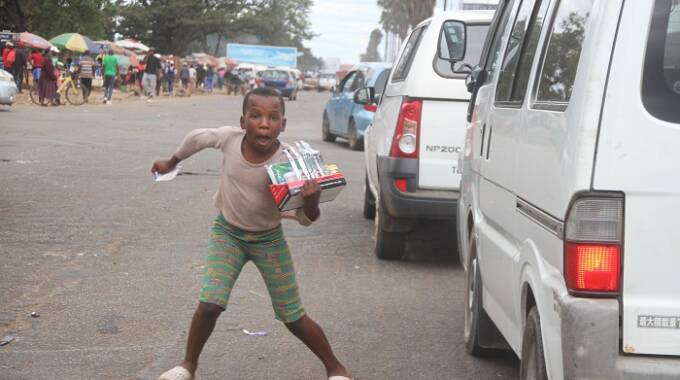
DURING the peak hour, human traffic in Central Business Districts (CBDs) across towns and cities naturally swell, as commuters frenziedly make their way to various pick-up points for transport to take them back home.
Harare, the capital, typically becomes hectic. Pavements become heavily congested.
Vendors add to the melee, as they take up swathes of the cityscape to capitalise on the last-minute shopping rush.
All this makes navigating around the city a nightmare.
Worryingly, some vendors, especially women, have their toddlers in tow, who playfully pace up and down the pavements.
It is now not unusual to see toddlers playing on the roads or crawling up and down the pavements, while their parents hawk wares to passers-by.
Some are even tethered or leashed to limit their movements. Some youngsters are even skipping school as a result.
Experts believe such a lifestyle can easily make the affected minors lose interest in school, lack basic interaction skills and courtesy.
“Are you here to ask me questions about my life? Do not waste my time. I am losing customers because of you,” charged one cheeky minor, who operates along Simon Muzenda Street in Harare, after The Sunday Mail Society engaged her.
Last week, another girl — who is often seen at the corner of First Street and Robert Mugabe Road, and claims to be five years old — was in the company of her younger brother (aged two) and mother, who sells make-up accessories. And it seems the streets have corrupted her innocence.
“I stay with my two children in Epworth. My situation forces me to come to work with them because I cannot afford a helper at home,” said her mother.
“They (children) are now familiar with street life because we come here every day. Even my colleagues know them, so they are safe.”
At the corner of Jason Moyo Avenue and Angwa Street, a couple has their 13-month-old son on a leash.
The mother and the father sell candy and fruits, respectively.
“He is the last-born. We have two other sons who stay with my in-laws at our rural home. I will also take him there when I am done breastfeeding,” said the mother.
“I do not feel safe leaving him under the care of neighbours because of these horrible stories we often hear and read about. Domestic workers are not reliable; they can be nasty.”
Criminal offence
The Sunday Mail Society, however, understands that the authorities are now taking corrective measures.
“These children are being abused, so, under the Child Justice Bill, we will be able to arrest and take these parents to court for prosecution,” said Mrs Susan Ngani, who is the Ministry of Public Service, Labour and Social Welfare’s Harare provincial social welfare officer.
The law, she said, forbids vendors from being accompanied by minors to vending sites, whether designated or undesignated.
This reportedly contravenes Chapter 5:06 of the Children’s Act and attracts a jail term.
“Any parent or guardian of a child or young person who allows that child or young person or any person who causes any child or young person — (a) to beg; or (b) to accompany him or any other person while he begs; or (c) to induce or to endeavour to induce the giving of alms; or (d) to perform or be exhibited in any way for public entertainment in a manner likely to be detrimental to the child’s or young person’s health, morals, mind or body; shall be guilty of an offence and liable to a fine or to imprisonment,” reads part of the Act.
Mrs Ngani said although the Act has been in existence for some time, it was not being enforced. The Government is also working on a Child Justice Bill to buttress the protection of minors in Zimbabwe.
A day-care centre is set to be established in the CBD.
The facility will give first preference to vendors and parents working in town for them to leave their children under the care of skilled social workers during the day.
“A building has already been identified for that. Globally, day-care centres have become popular. This initiative was long overdue,” added Mrs Ngani.
“We are also engaging traditional leaders to ensure all children in villages go to school to break the cycle of poverty in all areas.”
Justice for Children, a children’s rights advocacy group, reckons that minors living and working on the streets are considered vulnerable and in urgent need of proper care in terms of Section 2 (i) of the Children’s Act (Chapter 5:06).
“Having a child with you at work is a violation of their rights, let alone in an environment like the streets, where they are subjected to verbal, physical and all other forms of abuse,” said the group.
“The parents also need to be enlightened on the dangers of what they are doing. It is time we adopt the concept of international standard day care centres that are up to standard and well-monitored.”
Psychological impact
Vendors often engage in violent cat-and-mouse games with municipal police. Others even try to use children as shields to avoid arrest.
“We normally confiscate wares. However, the owners usually want to either witness the management of their perishables or pay for the recovery of the items, so we ferry them in our trucks regardless of their parental status,” said Harare City Council acting spokesperson Mr Innocent Ruwende.
Psychologist and University of Johannesburg post-doctoral researcher Dr John Ringson says children who grow up on the streets or spend more time in such environments often develop behavioural and emotional complications.
Street life, he said, is often associated with wayward behaviour like foul language and loose morals, as well as drug and substance abuse.
“Young children are very good at copying what they see. It often sticks in the mind, and with time, the effects will start to show.
“A child’s brain is designed in a way that they learn fast, so, while the parents may be there to control them, it is very difficult to decide what they take in or not,” he said.
“Also, children who spend more time in such environments are at risk of having no interest in academics or struggle with their academics in future. This makes most of them prone to depression and eventually turn to drug and substance abuse.”
With access to drugs and firearms, these children may also end up engaging in crime or developing suicidal tendencies.
Another psychologist, Mr Blessed Chinyangare, urged the Government to tackle the issue holistically.
“By merely living on the streets, they are negatively affected, psychologically, hence a psycho-analytical approach in dealing with them is key.
At times, the effects will start to show in their mid-20s going upwards, which makes the situation sensitive because one may think all is well with their child; yet, in fact, it is not,” he warned.
Sunday Mail





